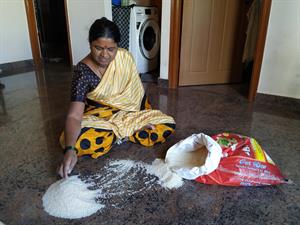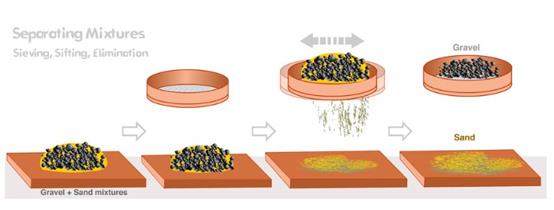PDF chapter test TRY NOW
Separation of solids:
This process involves,
- Handpicking
- Sieving
- Winnowing
- Threshing
- Magnetic separation
Handpicking:
If the impurities are visible, they are able to pick and separate by hand. This process is called handpicking.
Example: Separating stones from rice

Sieving:
Sieving is the process of separating different sizes of solid particles.
Example: Separating sand from gravel

Winnowing:
The process of separation of lighter and heavier components of a mixture by air is called winnowing.
Example: Removing of husk from rice and wheat

Threshing:
The separation of grains from their stalks by beating them very hard is called threshing.

Magnetic separation:
A magnetic separator is a device, which uses the magnet to separate the substances with magnetic properties from non-magnetic substances. The substance that is attracted to the magnet is called magnetic. This process is called magnetic separation.
Examples of magnetic substances are iron, gold and aluminium.

Sometimes combination methods are required to complete separation. For example, the separation of a mixture of sand and salt in the water that involves several steps are listed below:
- Sedimentation
- Decantation
- Filtration
- Evaporation
- Condensation
Evaporation: The process of converting liquid into vapour.

Condensation: This is the reverse process of vaporization, i.e., vapour into liquid.

